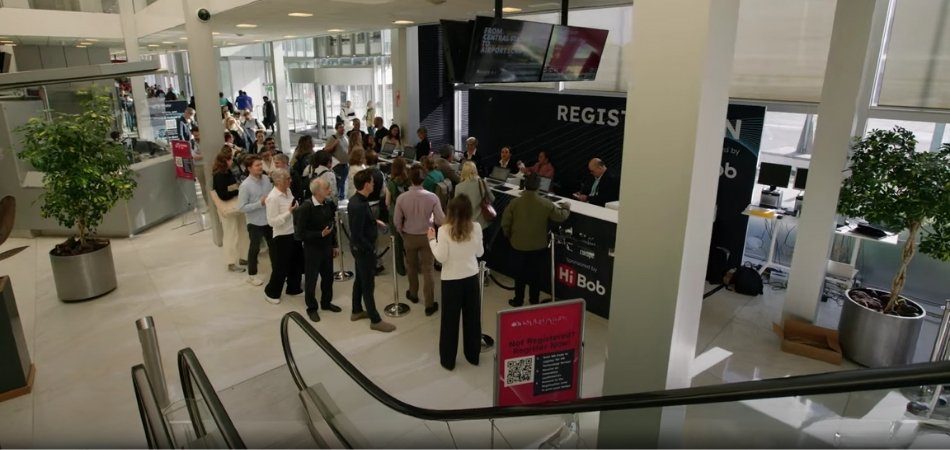Attending international conferences in Canada can be a valuable experience for professionals and academics alike. These events provide opportunities to learn from experts, network with peers, and gain insights into the latest trends in various fields. However, one of the most important aspects of attending is learning how to register international conferences in Canada.
To successfully register for these conferences, you need to follow a few essential steps. This includes identifying the right conference for your interests, preparing the necessary documents, and completing the registration process accurately.
If you are curious about the registration process and want to learn how to navigate it smoothly, this article will provide you with all the information you need. We will cover the steps to register, the necessary documents, and tips for a successful conference experience.
Why Attend International Conferences in Canada?
Attending international conferences in Canada offers numerous benefits. These events serve as platforms for sharing knowledge and expertise, and opportunities for collaboration. Participants can learn from industry leaders, engage in discussions, and discover new ideas that can reinforce their work.
Moreover, conferences offer valuable networking opportunities. Attending upcoming international conferences in Canada with invitation letter allows you to meet professionals from diverse backgrounds, encouraging collaborations and partnerships. These connections can be instrumental in advancing your career or research.
Additionally, conferences provide a platform to present your work. Sharing your research or insights with a broader audience enhances your credibility. Receiving feedback from peers further helps refine your ideas and improve your projects.
In addition, attending a conference can be a source of inspiration. Exposure to different perspectives can reignite your passion for your field. You may leave the conference with fresh ideas and renewed enthusiasm for your work.
How to Register International Conferences in Canada?
Registering for international conferences in Canada is an important step for anyone looking to expand their knowledge and network with professionals in their field. Knowing the registration process can help you secure your spot and make the most of the experience. Here’s a detailed guide to help you navigate the registration process effectively.
Identify the Right Conference
Start by researching international conferences that align with your interests and field of study. You can find lists of upcoming events on professional organization websites like Global Conference Alliance Inc. Pay attention to the conference themes and topics to ensure they match your expertise.
Consider factors such as location, date, and size of the conference. A smaller conference may offer more intimate networking opportunities, while larger events may feature a wider range of topics and speakers. Once you identify a conference, note the registration deadlines to stay on track.
Check the Conference Website
Visit the official website of the conference you are interested in. Here, you will find detailed information about the registration process, fees, and important dates. Make sure to read all the guidelines carefully to avoid missing any crucial details.
Most conference websites provide sections dedicated to registration, outlining the steps you need to follow. Look for information about early bird rates or discounts, as registering early can save you money. Familiarizing yourself with the website will also help you navigate the registration process smoothly.
Prepare Necessary Documents
Gather all required documents for registration. Commonly required documents include your resume, a statement of purpose, and, in some cases, an abstract of your presentation. Ensure these documents are updated and reflect your current qualifications and goals.
If the conference requires a letter of recommendation, reach out to colleagues or mentors well in advance. Allow them enough time to write and submit their letters before the registration deadline. Preparing these documents early will help avoid last-minute stress.
Complete the Registration Form
Once you have all your documents ready, fill out the registration form provided on the conference website, following the steps to apply for conferences in Canada. Ensure that you enter all information accurately, including your personal details, affiliation, and contact information. Double-check for any errors before submitting your application.
Some conferences may require you to pay registration fees at the time of submission. Be prepared to provide payment information and review the conference’s cancellation policy. Assessing the terms and conditions will help you make informed decisions if plans change.
Confirm Your Registration
After submitting your registration form, you should receive a confirmation email. This email will typically include your registration details and payment receipt. If you do not receive a confirmation within a few days, contact the conference organizers to ensure your application is received.
Keep a copy of the confirmation email for your records. It will be helpful when preparing for the conference and any travel arrangements. Confirming your registration early allows you to focus on other preparations for the event.
How to Prepare for the Conference After Registration?
Preparing for the conference is just as important as registering for it. A well-thought-out preparation can improve your experience and ensure you make the most of your time at the event. Here are some tips to help you get ready,
- Review the Conference Agenda: Familiarize yourself with the schedule of events, including keynote speakers, sessions, and workshops. Knowing what to expect will help you plan your time effectively. Mark the sessions that interest you the most so you can prioritize them during the event.
- Plan Your Travel and Accommodation: Make arrangements for travel and accommodation as soon as your registration is confirmed. Book your flights and hotel early to secure the best rates. Consider proximity to the conference venue when choosing accommodations to save time and transportation costs.
- Prepare Your Presentation (if applicable): If you plan to present at the conference, take time to prepare your presentation thoroughly. Practice your delivery and make sure to adhere to the time limits provided by the organizers. Engaging visuals can improve your presentation and capture the audience’s attention.
- Pack Appropriately: Make a checklist of items to bring, such as business cards, notebooks, and any necessary technology for your presentation. Dress professionally to make a good impression while networking. Being prepared will help you feel confident and comfortable during the event.
- Network Before the Event: Reach out to fellow attendees or speakers before the conference through social media or professional platforms. Connecting with others in advance can help you set up meetings or discussions during the event. Building these connections early allows for a more engaging and rewarding experience at the conference.
How to Choose the Right Conference to Attend?
Choosing the right conference can significantly impact your professional growth and networking opportunities. A well-selected conference aligns with your goals and helps you gain valuable insights and connections. Here are some essential factors to consider when selecting the best conference for you.
Align with Your Goals
Select a conference that aligns with your professional or academic goals. Consider whether you want to learn new skills, network with peers, or showcase your research. The right conference should cater to your specific interests and needs. Reflecting on your goals will help you identify the most beneficial opportunities for your career development.
Research the Speakers and Topics
Look into the speakers and topics being presented at the conference. Notable speakers can improve your learning experience and provide valuable insights that you can apply in your field. Choose a conference that features sessions relevant to your area of expertise. This alignment will ensure that the information you gain is both applicable and beneficial to your professional journey.
Evaluate the Format
Conferences may vary in format, including in-person, virtual, or hybrid options. Consider which format best suits your preferences and schedule, as each offers different levels of interaction and engagement. In-person conferences allow for face-to-face networking, while virtual ones can offer flexibility. Evaluating the format helps you choose an event that fits your learning style and logistical needs.
Seek Recommendations
Ask colleagues or mentors for recommendations on conferences they have found valuable. Their experiences can guide you in selecting an event that meets your expectations and provides relevant content. Personal referrals often lead to discovering hidden gems that you may not have encountered otherwise. Using your network can increase your chances of attending a conference that truly benefits you.
Assess Cost and Accessibility
Consider the cost of attending the conference, including registration fees, travel, and accommodation expenses. Make sure it fits within your budget to avoid financial strain. Additionally, assess the accessibility of the conference location, especially if you have specific needs. Ensuring that you can comfortably attend will help you focus on maximizing your experience during the event.
What Documents Do You Need for Registration?
When registering for international conferences, gather the necessary documents to ensure a smooth registration process. Typically, you will need to provide a completed registration form, which includes your personal information, professional details, and the specific sessions or workshops you wish to attend. Make sure to fill out all required fields accurately to avoid delays in processing your application.
In addition to the registration form, you may be required to submit a resume or curriculum vitae (CV). This document highlights your professional background, education, and relevant experiences. Including a CV can help the conference organizers understand your qualifications and determine your fit for the event. If you are presenting at the conference, you might also need to provide an abstract of your presentation. This should outline your topic, research findings, and relevance to the conference theme.
Some conferences may require a letter of recommendation or a statement of purpose. These documents help convey your motivations for attending and note that getting invited to international Canadian conferences should be aligned with your actual purposes. Having these documents prepared ahead of time will help streamline your registration process and ensure you meet all the requirements for a successful application.
Tips for a Successful Conference Experience in Canada
Attending a conference can be an enriching experience, providing opportunities for learning, networking, and personal growth. To make the most of your time at the event, prepare effectively and engage actively. Here are some practical tips to help you navigate your conference experience and maximize its benefits.
- Set Clear Goals: Before attending, define what you hope to achieve. Whether it’s networking, learning new skills, or gathering insights, having clear objectives will guide your actions.
- Plan Your Schedule: Review the conference agenda and select sessions that align with your interests. Prioritize keynotes and workshops that will provide the most value to you.
- Network Actively: Take the opportunity to introduce yourself to other attendees, speakers, and exhibitors. Bring business cards and follow up with new contacts after the conference to maintain connections.
- Engage in Discussions: Participate in Q&A sessions and discussions. Asking questions and sharing your thoughts can deepen your knowledge and improve your experience.
- Take Notes: Write down key takeaways and ideas during sessions. Reviewing these notes later will help reinforce what you learned and can aid in applying new concepts.
- Explore the Location: Take time to discover the city where the conference is held. Engaging with the local environment can better your overall experience.
Frequently Asked Questions (FAQs)
Finding your way around conferences can raise many questions. To help you prepare effectively and ensure a successful experience, we’ve compiled some common inquiries and their answers. Whether you’re new to attending conferences or looking to refine your approach, these FAQs provide valuable insights. Here are some essential questions to consider:
What Should I Wear to a Conference?
The dress code can vary depending on the conference type, but business casual is often a safe choice. Aim for comfortable yet professional attire that allows you to move freely during networking and sessions. If you are unsure, check the conference website for any specified dress guidelines. Dressing appropriately helps make a positive first impression.
How Do I Prepare for Networking at the Conference?
To prepare for networking, research attendees, speakers, and companies participating in the conference. Set specific goals for whom you want to meet and what you want to achieve. Bring plenty of business cards and practice your elevator pitch to introduce yourself effectively. Being prepared will help you make meaningful connections.
Can I Attend a Conference Without Presenting?
Yes, many conferences welcome attendees who are not presenting. Participants can still gain valuable insights and network with others in their field. Attending can be a great opportunity to learn and prepare for future presentations. Engaging with the content and discussions can still benefit your professional development.
What Should I Bring to a Conference?
When attending a conference, be sure to bring essential items such as business cards, a notebook or tablet for taking notes, and a refillable water bottle. Comfortable shoes are also a must, as you may be on your feet for extended periods. Additionally, consider packing chargers for your devices and any materials you may need for networking or presentations.
How Can I Follow Up After the Conference?
After the conference, reach out to the contacts you made by sending a personalized email or LinkedIn message. Mention something specific you discussed to help jog their memory. Following up shows professionalism and reinforces the connection you built during the event. This practice can lead to further opportunities for collaboration or support in your career.
Final Thought
Attending international conferences in Canada offers invaluable opportunities for learning, networking, and professional growth. By engaging with industry experts and fellow attendees, you can gain new insights and expand your knowledge in your field. A successful conference experience can significantly boost your career and personal development.
To effectively participate, you should know the answer to “How to register international conferences in Canada?” This process typically involves researching the right conference, completing the necessary registration forms, and preparing relevant documents. By following these steps, you can secure your spot and ensure a rewarding experience.








